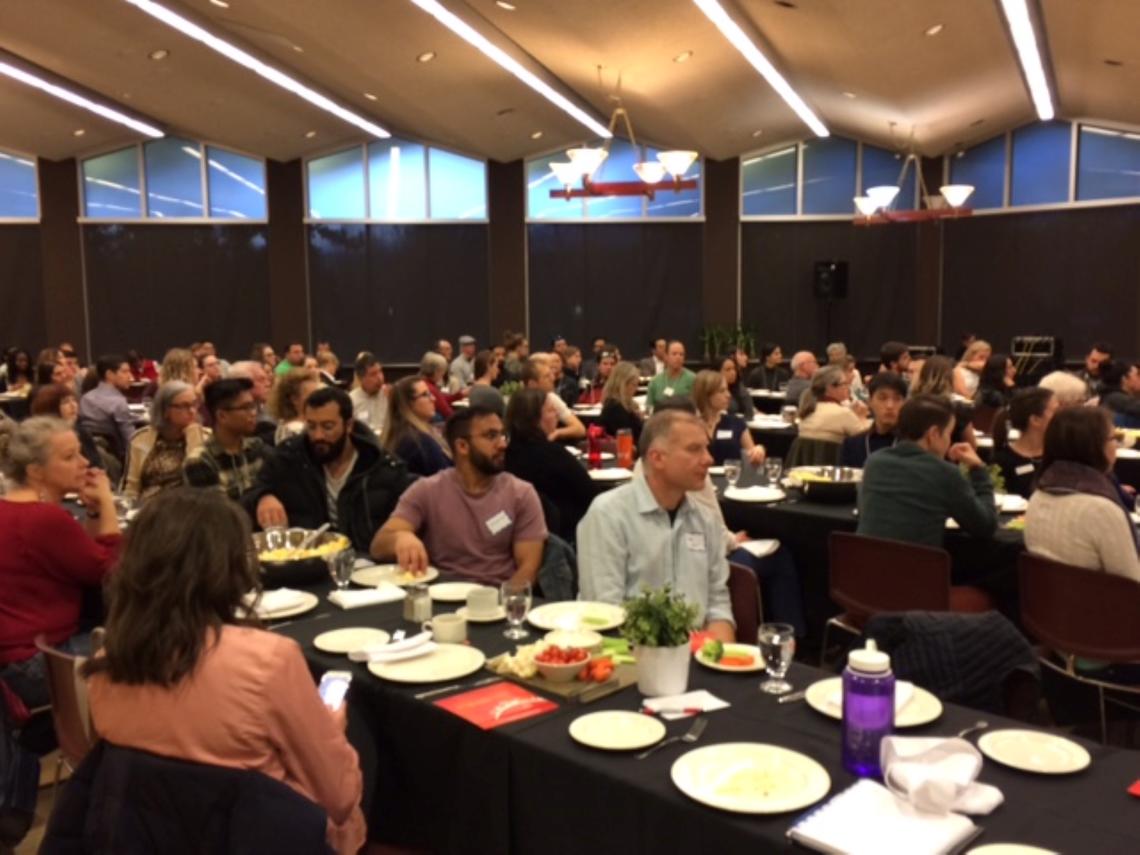Jan. 10, 2018
Dinner and dialogue served up as experts dig into food trends and innovations
Over sustainably sourced plates of rice, vegan curry and salad, about 200 people passed around naan bread and chewed on some startling statistics — such as we import 95 per cent of our produce in Canada and we throw out $31 billion of food every year — as part of a panel discussion about food trends and innovation.
The panel was the latest in the Calgary and Beyond: Sustainability in the Next 20 Years speaker series. As people settled in, the screens flashed innovations in food such as beef grown from cattle’s stem cells, edible water bottles, and lunar gardening.
Before dinner, each panellist spoke about the challenges and opportunities around food production innovations, as well as food insecurity and waste. Then the panellists joined the audience at their tables to enjoy the family-style meal and talk about food. As dessert was served, the panellists returned to the stage for a lively Q-and-A.

Ahead of dinner, event attendees listen to a presentation on food trends and innovations.
University of Calgary photo
From the pleasures of eating to the politics of food
One panellist, UCalgary’s Lisa Stowe, PhD'16, noted that discussion in her Culture of Food class has changed over the last seven years from focusing on the pleasures of eating to the politics of food. “It’s a complicated world of food culture,” says the instructor in the Department of Communication, Media and Film. “The more we talk about it, the better consumers we will be.”
Stowe suggests people learn how to cook and “grow a tomato plant” to do their part to help reduce food waste. “Because if you learn how to cook and you make your own food, you’re less likely to throw it out,” she said. “And if you grow your own food or you know someone who has grown your food, you are less likely to throw that food out as well.”
Re-establishing that connection to agriculture and how our food is produced is important for people to understand in order have a healthy food systems ecology, said Tom Lynch-Staunton, issues manager at the Canadian Cattlemen's Association. “Ninety-four per cent of Canadians know little or nothing about farming. It’s a challenge.”
Locally-raised beef can be an important part of a balanced, nutritious diet, he added. “We live in a global food system where it may be more efficient to ship a tomato from Mexico. That’s a reality but we have to figure that out, and buying local builds that reconnection back to agriculture.”
Solving problems, one innovative step at a time
Paul Schumlich is growing produce and fish for restaurants in Calgary all year long using an innovative aquaponics system. “You can’t solve all the problems at once but you have to take the first step,” said the president and CEO of Deepwater Farms. “There are so many problems and there are so many opportunities, and we just took a leap.”
In the Q-and-A, Schumlich also pointed out that when we toss wilted produce from the back of the fridge, “we’re throwing away water, we're throwing away fertilizer and we’re throwing away arable land.” Deepwater Farms is innovating food production in a way that minimizes wastes from growing our food.
Lourdes Juan, BGS'05, MEDes'09, founder of Calgary’s Leftovers Foundation, has found an innovative way to address food waste. Leftovers Foundation’s primary work is to collect unwanted food from restaurants, grocery stores and bakeries and deliver it to social agencies to feed people. Juan offered the story of when the foundation collected over-ripe bananas from a local grocer, along with day-old loaves of bread from Cobbs Bakery and took them to Made by Marcus Ice Creams, who turned them into Banana French Toast Ice Cream for their customers.
“Four million people in Canada don’t know where their next meal is coming from,” Juan said. “When we think about food insecurity we think about people living on the street, when in fact most food-insecure Canadians have homes, they are university students, grandparents, and they are children.”
The panellists urged people to buy only the food you need, buy local when you can and cook at home more often. “Practise mindfulness and respect where the ingredients come from,” said the moderator, chef and SAIT instructor Andrew Hewson. The ideas from the discussion showed us that the trends in food right now are returning to the basics, and being innovative in addressing food waste.
Waste: the Socioeconomic Footprint event scheduled for Jan. 23
Join our panel of experts at the next speaker series event Waste: the Socioeconomic Footprint, Tuesday, Jan. 23, 4 to 7 p.m. for a seated table discussion that explores how people can reconsider their consumption habits and where they put their waste.
Calgary and Beyond: Sustainability in the Next 20 Years features thought-provoking panel presentations and audience discussion toward sustainable and scalable solutions to complex social, ecological and economic challenges. The series is an Office of the Provost initiative, led by the Academic Sustainability Advisory Committee in partnership with the Office of Sustainability and supported by UCalgary Alumni. Learn more about UCalgary’s Institutional Sustainability Strategy and find out how we are doing in the 2017 Sustainability Report.
